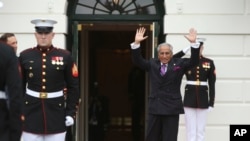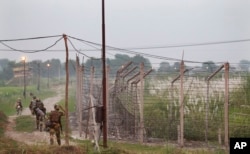An unusually frank conversation between U.S. President-elect Donald Trump and Pakistani Prime Minister Nawaz Sharif has led to speculation the incoming president might be willing to use unconventional means to address issues that have caused mistrust in bilateral ties.
According to a Pakistani government readout, the U.S. president-elect said Sharif was “a terrific guy” and doing “amazing work.” According to the statement, Trump said he would love to visit what he called a fantastic country with fantastic and amazing people.
While the government's readout has raised considerable debate over diplomatic practices, the Pakistan government has been quick to take the opportunity to improve a rocky relationship.
On Monday, Prime Minister Sharif’s key foreign policy aide, Tariq Fatemi, began a series of meetings in Washington to carry forward the conversations with the president-elect's team.
During a 10-day stay, Fatemi also is to brief members of the U.S. Congress and research institutions on Pakistan's efforts to counter terrorism and promote regional peace and stability.
For years, U.S. leaders have blamed Pakistan for being behind the rise of the Taliban insurgency in Afghanistan, where thousands of U.S. troops are battling terrorist groups and training Afghan security forces.
Islamabad denies Taliban insurgents are sheltering in Pakistan. Officials say the porous 2,600-kilometer border with Afghanistan encourages illegal insurgent movements and that presence of nearly three million Afghan refugees in Pakistan affords Taliban militants a hiding place.
Commentators and former diplomats have described Trump’s expressions and the Pakistani readout as hilarious, ridiculous, amusing, amazing and alarming. Pakistani officials and Sharif’s advisers dismissed the criticism.
“The readout was not against any diplomatic norms. It has not been snubbed by the Trump team and barring a few people, a majority of them have not spoken about it,” said a Pakistani Foreign Ministry official, speaking to VOA on condition of anonymity.
Syed Mushahid Hussain, a key Pakistani senator, also disagreed with criticism of Trump’s conversation with Sharif, saying it shows the president-elect believes in applying an approach not based on the status quo and not reading from the traditional Washington playbook.
“Mr. Trump has not gotten where he has following the traditional rules of the game. He has, in fact, trumped the traditional American political elite, the pundits, the politicians and the press,” Hussain told VOA.
Senator Hussain blamed outgoing U.S. President Barack Obama and his predecessors for tensions in bilateral ties and problems the U.S.-Afghan policy faces.
“We felt that Mr. Obama ... he really failed to figure out Pakistan and the region and he sidelined Pakistan. He was the only American president who visited our region twice without visiting Pakistan. So, actually, he snubbed Pakistan directly and his Afghan and Pakistani policies were a failure,” he said.
According to Pakistan's readout, Trump said he is “ready and willing" to play "any role" in finding solutions to outstanding problems.
Fatemi said Trump was referring to Pakistan’s long-running dispute with India over the Kashmir region that is split between Pakistani and Indian control and claimed in its entirely by both nuclear-armed rivals.
The U.S. Pakistani phone call raised eyebrows in India, but officials and analysts in New Delhi did not interpret it as a signal of what the Trump administration’s policy will be in South Asia.
New Delhi also did not interpret Trump’s offer to play “any role" as a signal he would be ready to mediate the Kashmir issue.
India has consistently rejected third-party mediation on Kashmir, calling it a bilateral dispute.
Indian Foreign Ministry spokesman Vikas Swarup said, “Well, we believe that the most outstanding of the outstanding issues is Pakistan's continued support to cross-border terrorism. To that extent, we would welcome a dialogue between the U.S. and Pakistan to resolve that particular issue.” Pakistan has rejected the allegations of terrorism.
A former Indian ambassador to the United States, Lalit Mansingh, said he did not see any reason to "panic" about the Trump and Sharif conversation. Referring to Trump’s offer to play a role to find solutions, he said, “That certainly does not translate into being mediator on the Kashmir dispute or anything."
Mansingh said in India, the conversation is not being looked at as the position of the U.S. administration.
“President-elect Trump has been remarkably hard to figure. ... He constantly keeps us guessing,” wrote Michael Kugelman of Woodrow Wilson International Center for Scholars in the Pakistani newspaper DAWN.
“But then again, we could be wrong to believe that Trump will take a sanguine position on U.S.-Pakistan relations. After all, as analysts, we do tend to be wrong sometimes - about Trump and so many other things too," said Kugelman.
(Anjana Pasricha in New Delhi contributed to this story.)





